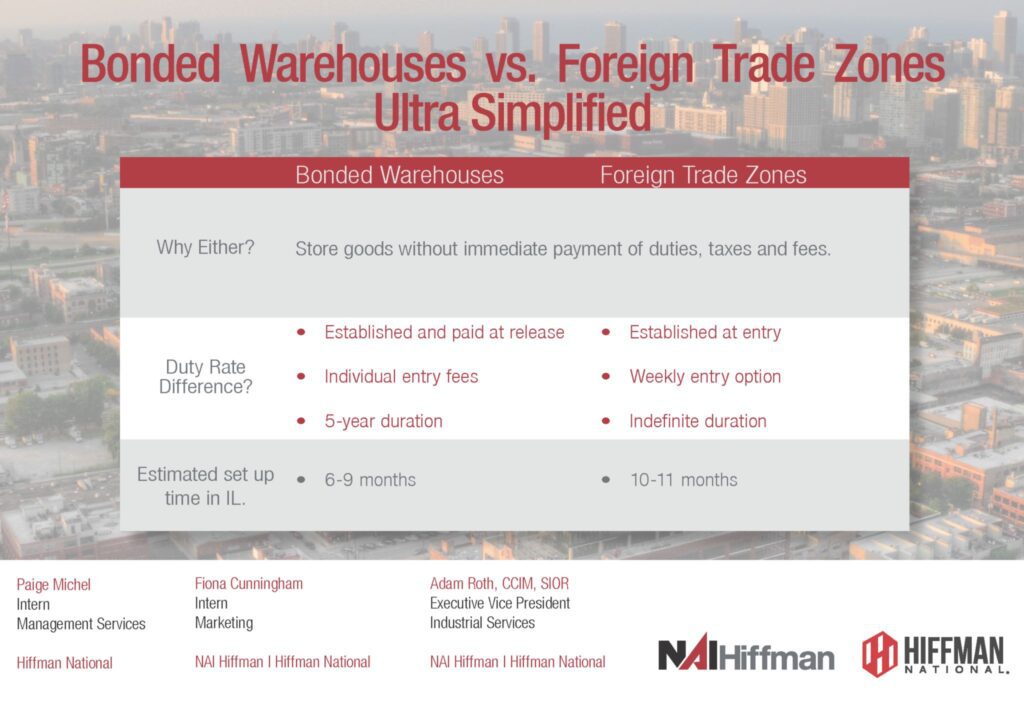July 2025
Understanding Foreign-Trade Zones: A Tool for US Importers
By: Adam Roth, Executive Vice President – Industrial Services & George Weems, Intern – Industrial Services
Recently, we had the opportunity to take a deep dive into the United States Foreign-Trade Zones (FTZ) program, specifically researching the program’s benefits and mechanics. Though we initially believed our understanding to be sufficient, we felt it was worth revisiting the program’s subtleties. After reviewing the program’s benefits, one conclusion becomes abundantly clear: FTZs don’t suit every business, but for those that fit, the potential savings and operational advantages can be transformative.

The Foreign-Trade Zones Act of 1934 created the U.S. Foreign-Trade Zones program, which has grown to include approximately 200 zones nationwide. As of 2023, these zones employed over 550,000 individuals and received $949 billion worth of shipments. FTZs collectively process billions of dollars in goods annually, making them a crucial component to US trade infrastructure.
The program also offers numerous benefits to manufacturers and distributors operating in the United States. However, a few core benefits drive program participation: duty deferral, duty exemption of re-exports, duty elimination on waste, and weekly entry.
An FTZ is considered to be outside the commerce of the United States and its customs territory. Because of this, customs duties are deferred until imported merchandise enters United States commerce. Therefore, no customs duty is ever due on imported merchandise that is exported back out of the country without entering U.S. commerce – also known as the duty exemption of re-exports.
The same principle applies to duty elimination on waste, as imported materials that are either lost or destroyed during the production process never reach the commerce of the United States. Therefore, such materials are exempt from duty.
These benefits can be significant; but we would like to focus on one relatively newer amendment to the program that deserves particular attention because it can enormously impact an importer’s bottom line — the Trade and Development Act of 2000. This amendment allows users to file weekly customs entries as opposed to no longer needing to pay for each entry’s processing.

Regardless of whether goods are admitted through a FTZ or not, every US importer must pay a Merchandise Processing Fee (MPF) of 0.3464% of each formal entry’s declared value with US Customs and Border Protection (CBP). An entry becomes a formal entry when the shipment’s merchandise is valued at over $2,500. For electronically filed entries, the MPF paid has a minimum of $32.71 and a maximum of $634.62, per entry.
“FTZs don’t suit every business, but for those that fit, the potential savings and operational advantages can be transformative.”
Yearly, these amounts can be adjusted to match inflation per the Fixing America’s Surface Transportation (FAST) Act. If an entry is filed non-electronically, an additional surcharge of $3.93 per entry is applied and processing may be slowed. This is rare, however, as electronic filings are completed via CBP’s Automated Commercial Environment (ACE), which is a platform for processing and documentation.
At first glance, the weekly entry filing savings potential authorized by the Trade and Development Act, may not appear significant. However, assume for example a company has 20 entries per week, each large enough to prompt the payment of the maximum MPF.
Non-FTZ entry payments would equate to $12,692.40 ($634.62 x 20) per week. Annually the amount would be $660,004.80 ($12,692.40 x 52). Now, if the same company utilized a FTZ, the weekly payments would be $634.62. Annualized, the total cost utilizing Weekly Entry is $33,000.24 ($634.62 x 52). The savings provided in this example would be $627,004.56 ($660,004.80 – 33,000.24) annually.
Don’t let FTZ misconceptions prohibit you from determining whether they could benefit your operation. Within an FTZ, domestic and foreign materials do not have to be physically segregated, meaning they may be comingled or stored together. In addition, US customs is not required to have an on-site presence, but spot checks can occur, usually on an annual basis. Taking advantage of the Foreign-Trade Zone program and its processes does require proper due diligence and is not a task to be taken lightly. Compliance is critical, while companies must maintain a strong understanding of their distribution and import operations to ensure success.
Companies physically located within the boundaries of a designated Foreign-Trade Zone may access the benefits. Alternatively, it is possible to designate a company’s existing site as an FTZ; but the cost and time may be prohibitive. As a result, an ideal time to consider implementing an FTZ would be in conjunction with a new industrial development or facility expansion. Astonishingly, many of the leading site selection tools overlook the FTZ criterion within their methodology, despite its potential to deliver savings.
About NAI Hiffman:
NAI Hiffman is one of the largest independent commercial real estate services firms in the US, with a primary focus on metropolitan Chicago, and part of the NAI Global network. We provide institutional and private leasing, tenant representation, capital markets, project services, research, and marketing services for owners and occupiers of commercial real estate. To meet our clients’ growing needs outside of our exclusive NAI Hiffman territory, we launched Hiffman National, our dedicated property management division, which provides facility management, accounting, lease administration, lender services and project services across the country. NAI Hiffman | Hiffman National is an award winning company headquartered in suburban Chicago, with more than 275 employees strategically located throughout North America.
About Hiffman National:
Hiffman National is one of the US’s largest independent commercial real estate property management firms, providing institutional and private clients exceptional customized solutions for property management, project management, property accounting, lease administration, marketing, and research. The firm’s comprehensive property management platform and attentive approach to service contribute to successful life-long relationships and client satisfaction. As a nationally bestowed Top Workplace, and recognized CRE award winner, Hiffman National is headquartered in suburban Chicago, with more than 275 employees nationally and an additional six hub locations and 25 satellite offices across North America.




